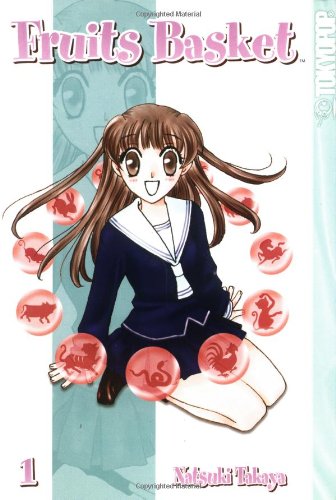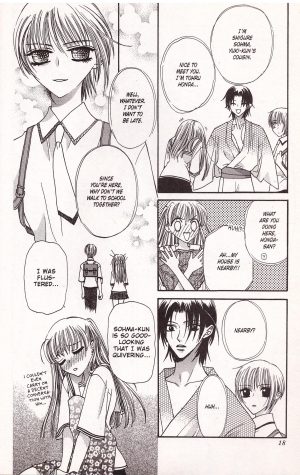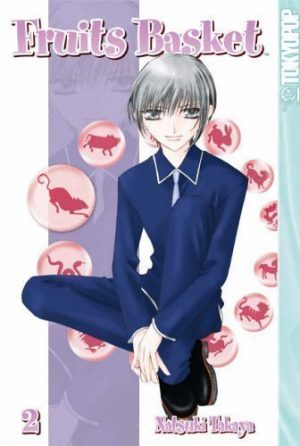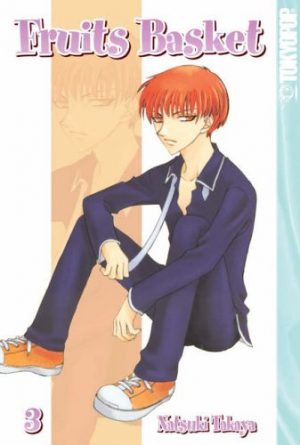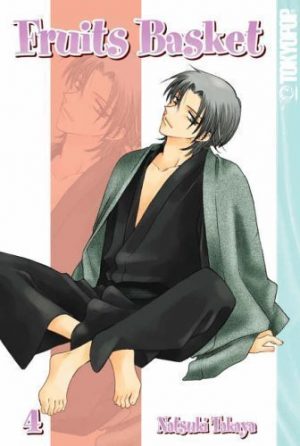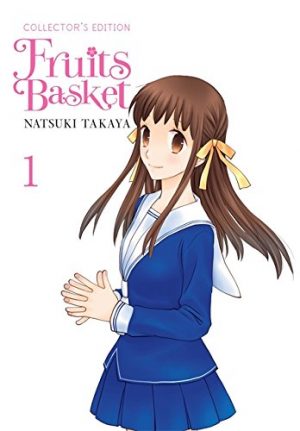Review by Ian Keogh
Fruits Basket is named after a Japanese children’s game to which lead character Tohru Honda makes reference in this volume’s final chapter, and when originally translated from Japanese, these pocket editions proved to be Tokyopop’s most successful title. They’re now more readily available in the larger Yen Press Collector’s Edition format, each combining two of the Tokyopop editions.
For all the success and allowing for the need to surprise, Fruits Basket isn’t very accessible at the start until readers have attuned to Natsuki Takaya’s stylised form of storytelling. This is more than just switching between a form of naturalism and cartoon exaggeration and the enormous manga eyes, which Takaya draws larger than most. She’s a cultured artist who provides long, thin characters, but sometimes throws in totally inexplicable anomalies, such as Tohru’s eyes drawn as if those of a fly, and distracting commentary on her story. They’re seen on the sample page, which also shows what a good artist Takaya is within the simplicity of her designs.
Due to circumstances related in the opening chapter, while attending school and holding down a job, Honda has been living in a tent, and when that’s no longer viable she’s given a home by members of the Sohma family, the district’s wealthy landowners. They have a secret, one revealed in the second chapter, but best discovered when reading. It’s an interesting idea, given a wacky, random, limiting factor of a type frequently used in manga comedy dramas. Once the explanations are out in the open, the set-up is established and Fruits Basket becomes easier going. The older Shigure Sohma supervises his teenage cousins Yuki and Kyo, constantly battling and with very different personalities, and Tohru slowly finding out more about each of them, and further Sohmas, provides the series with its constantly shifting emotional moods. In places the rivalry between Kyo and Yuki comes across as contrived to provide conflict, but later revelations provide it with greater context.
That’s typical of the entire series. It seems to begin with that Takaya’s supplying a relatively commonplace comedy drama, accentuating reactions to push buttons, but the depths are only gradually revealed, and not always apparent in this introductory volume. The secret best not revealed in a review offers some explanation, though, and as more consideration is applied to it, the possibilities open up.
Another series speciality is Takaya opening her heart in columns created alongside the page she’s drawing. These are sometimes funny, sometimes head-scratching, but always honest, and only found in these original editions. When the time came for the Collector’s Editions Takaya felt they represented where she was at the time, not her current position, so they were edited out.
A change of circumstances occurs in the final chapter, leaving Tohru reflecting on what she really wants, and it’s settled to lead us into book two. Some people may adjust easily to Takaya’s storytelling over the opening chapter, but if it appears difficult to follow, stick with it, as Fruits Basket is worth the journey. More revelations follow in Fruits Basket 2.
